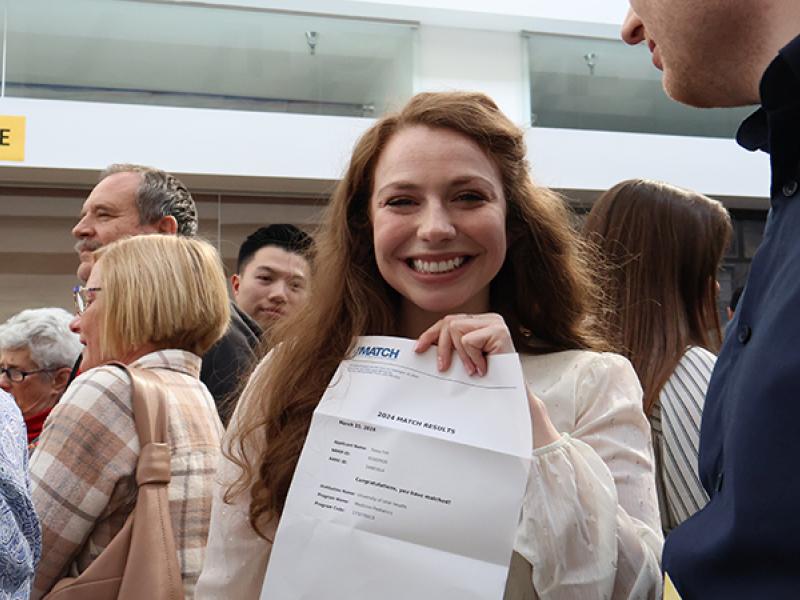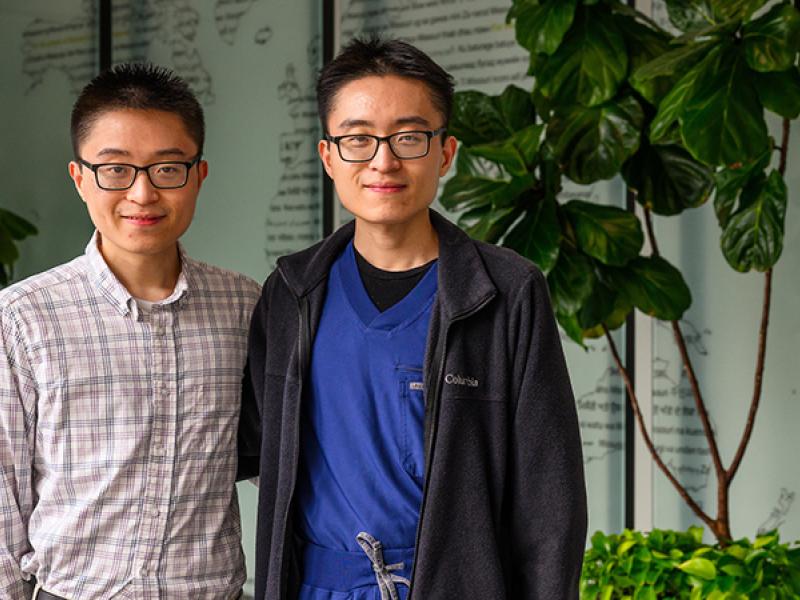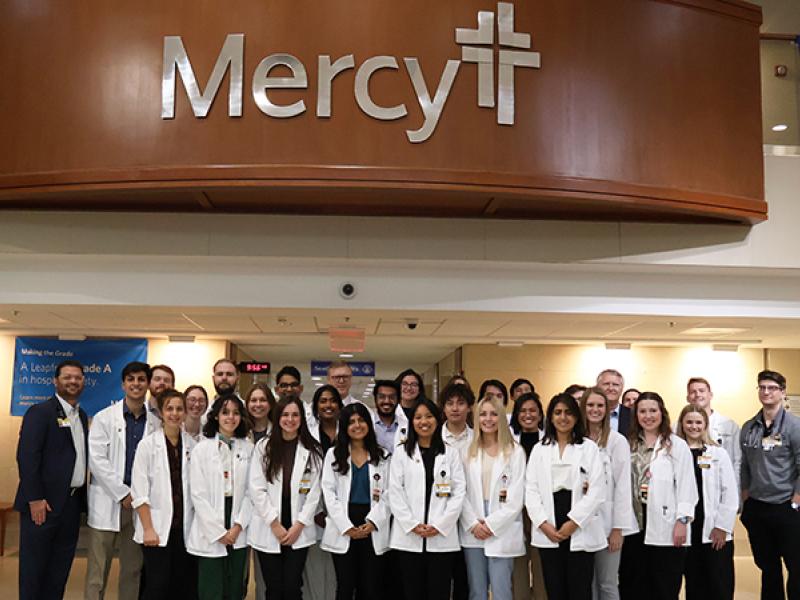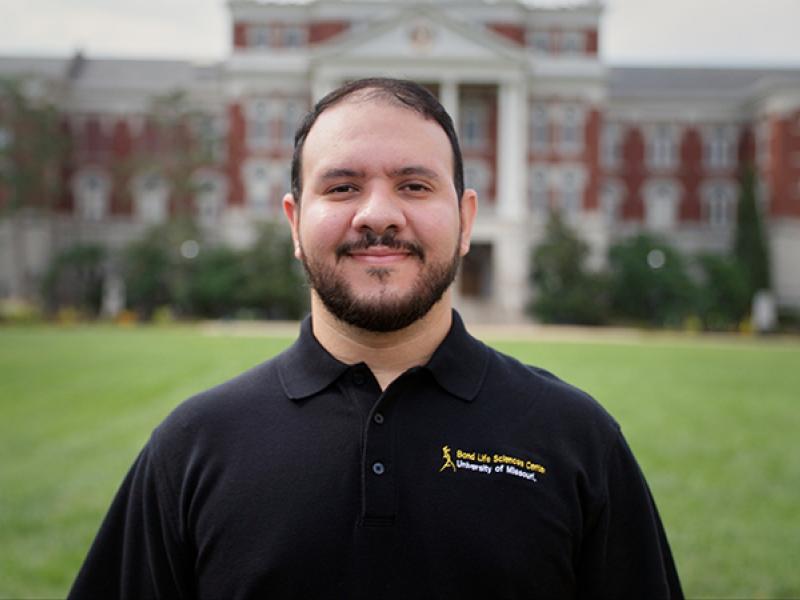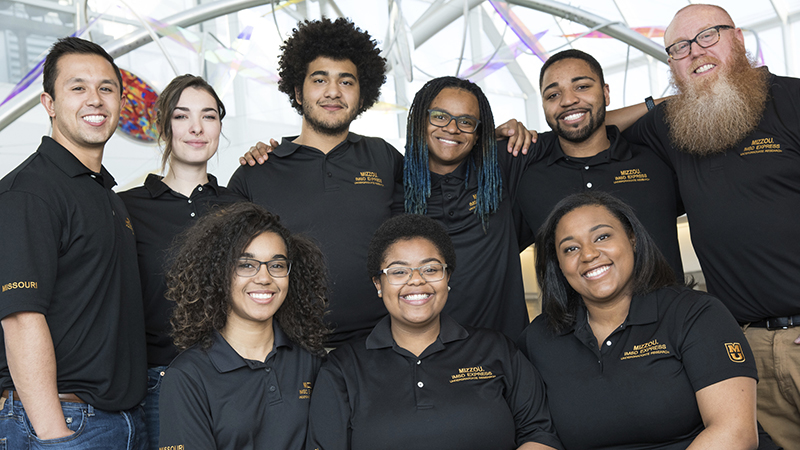
By Marcus Wilkins
Flip through a brochure for practically any institution of higher learning and you’re sure to see a familiar photo: goggled student, pipette in one gloved hand, petri dish in the other, beaming amid Bunsen burners and beakers in a brightly lit laboratory.
The image is a “quick read,” meant to illustrate research opportunities at a big-time college. But at the University of Missouri, where hands-on undergraduate research is a way of life, it’s more than a marketing angle.
“Research at Mizzou has helped me learn how to persist through difficult times,” says Ashley Aguillard, BS ’18 (biochemistry) and a nutrition doctoral student at the University of North Carolina–Chapel Hill. “There will be periods of time when the research is going quickly and smoothly and other times when things get slow and difficult. These moments are inevitable, and when they occur, you look back on what is driving you and remember the people you’re doing it for.”
Aguillard is one of 451 undergraduate students over the past 10 years to come through the Initiative for Maximizing Student Diversity (IMSD), a program designed to develop the research and professional skills of students from underrepresented groups. These include students from racial and ethnic minorities, students with disabilities, and students from disadvantaged backgrounds.
Mark Hannink, professor of biochemistry, and Linda Blockus, director of the Office of Undergraduate Research, are the principal investigators of the program, and Brian Booton has led the initiative as the undergraduate director since 2008. More than 100 faculty members serve as mentors in research areas across Mizzou, helping IMSD undergrads conduct world-class research much sooner than most students at large research universities.
“Undergraduate researchers want to save the world, and there is nothing like those bright eyes and anxious hands wanting to make a difference,” says Charlotte Phillips, professor of biochemistry and child health. “Helping them to get started and get opportunities to answer real questions is important. More than half of my undergraduates have gone on to get their PhD or MD.”
Funded by the National Institute of Health (NIH), the program’s ultimate goal is to increase the number of underrepresented students pursuing careers in biomedical research.
“The overwhelming majority of first-year participants self-identify as pre-med, pre-pharm, pre-dental, et cetera — what we think of as pre-clinical or health care professionals — and those are wonderful goals,” says Booton. “I always say, God knows we need to diversify the healthcare workforce. We don’t have a health care workforce that even closely mirrors our society. And yet we have even less of a biomedical research workforce that mirrors our society.
“Diversity leads to innovation, and that’s why programs like ours exist. I tell students, we’re not here to convert you. The program is here to expose you to research. To see if, perhaps, a career engaging in the science behind medicine is the way you’d like to utilize your curiosity in science.”
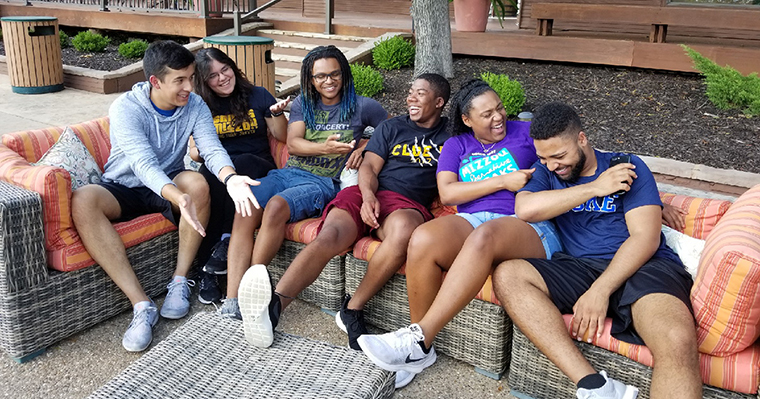
IMSD is a comprehensive program that integrates research and mentoring with academic and social support to help students excel. The first two years of the program include weekly meetings focused on academic, personal and professional development. Juniors and seniors progress to a different weekly seminar focused on taking ownership of one’s undergraduate research project along with graduate school preparation.
IMSD scholars also participate in national events such as the Annual Biomedical Research Conference for Minority Students (ABRMCS) — all while conducting undergraduate research with the support of faculty mentors and their respective research teams. It’s a holistic approach that leads to stellar retention and graduation rates, and postgraduate success.
Due to a new NIH funding structure, which makes a distinction between funding awarded to research intensive institutions such as MU and non-research intensive environments, the program’s name has changed to Maximizing Access to Research Careers (MARC). Structurally, MU’s initiative remains the same. The first two years of programming will be supported by university funding, but NIH will make an even larger investment in juniors and seniors who are committed to pursuing a PhD.
“The IMSD program seeks to challenge the notion of who belongs in science and research,” says Booton, noting that inclusion and equity in STEM have long been topics in the national discourse. “We nurture the student’s genuine curiosity in STEM and provide exceptional programming in order to broaden participation of students from underrepresented backgrounds. Our goal is to create an affirming, inclusive space where diverse talent thrives.”
Read on about students who have excelled through the IMSD program.
Ashley Aguillard
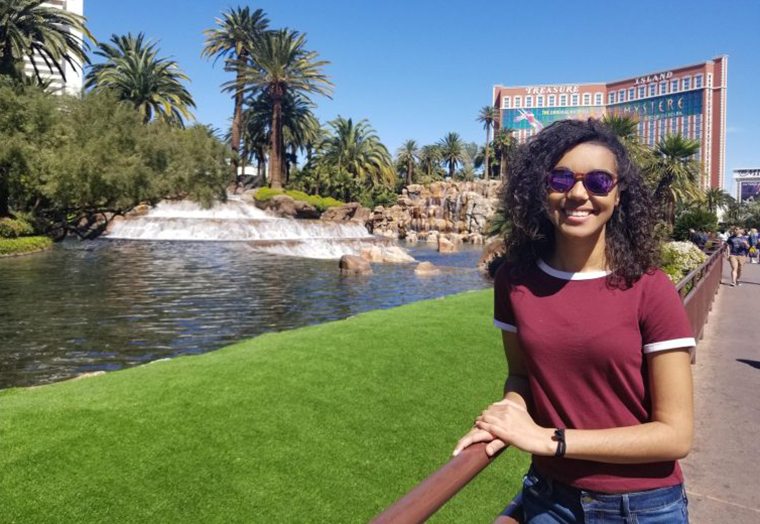
Hometown: Baton Rouge, Louisiana
Degree, major: BS ’18, Biochemistry
Faculty mentor, department: Charlotte Phillips, biochemistry
Current endeavors/accolades: National Science Foundation Graduate Research Fellowship recipient, nutrition doctoral student at the University of North Carolina at Chapel Hill
What did you enjoy most about the experience academically and socially?
“I enjoyed the opportunity to meet other scientists who looked like me and had similar goals. It’s not something you find very often in undergrad, and it gave me a sense of belonging at Mizzou. I became close friends with people who I might not have met otherwise, and I still keep in touch with them.”
Why is it important for young people to get involved early in STEM research?
“Whether you become a doctor, lab technician or graduate student upon graduation, undergraduate research gives you experience that will help you later in your job search. Even for students who go into the medical field, having research experience will help you think about the science from a researcher’s perspective. You will understand laboratory techniques and learn to how to critically read scientific literature. Understanding the literature behind a drug or treatment will help you when prescribing medicine or recommending treatment options to patients.”
Janae Bradley

Hometown: St. Louis
Degree, major: BS BE ’15, Bioengineering
Faculty mentor, department: Sheila Grant, biological engineering
Current endeavors/accolades: GEM Fellowship recipient, PhD candidate at Mizzou in the Department of Biomedical, Biological and Chemical Engineering
How did the mentorship component of the program effect your research, and college, experience?
“As a mentee, I loved that I had someone to talk to who was not judgmental and would just listen to whatever I was struggling with whether academic, personal or social. My mentor helped me improve my time management skills, gave tips on how to study for certain classes and helped me find my research lab.
As a peer mentor, having someone look up to me kept me accountable so that I was implementing the things I was providing advice on. I also got to serve as an example that things get better. I really enjoyed seeing the growth of my mentees. I gained effective listening and time-management skills, and I stepped out of my comfort zone, which helped me as a graduate mentor and in my personal life.”
Maha Hamed
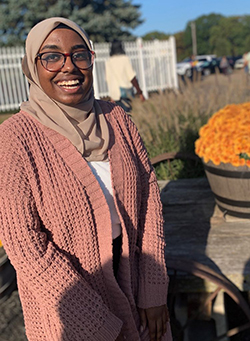
Hometown: Columbia
Degree, major: BS ’19, Biochemistry
Faculty mentor, department: Antje Heese, biochemistry
Current endeavor: PhD student in cellular and molecular biology at the University of Michigan
What led you to IMSD at Mizzou, and why did you choose to participate?
“Coming into Mizzou my freshman year, I knew I wanted to be involved in undergraduate research. During Summer Welcome they had a booth for IMSD-EXPRESS, and they told me it was a great way to get involved in research — and that I could get paid for it. Research can be very intimidating, especially as a person of color. As a young student, when you don’t see other Black and people of color in the STEM field, you might feel as though you are not meant to pursue a degree in STEM. IMSD-EXPRESS gave me a pathway to participate in undergraduate research and a community of students and faculty to lean on.”
What are the lessons you learned in your Mizzou research that you still use today?
“The biggest lesson I learned while doing research at Mizzou was how to persevere through failure. As a scientist, a majority of your experiments will fail. But the process of learning from those failures is when true innovation and discovery happens.”
Romanus Hutchins
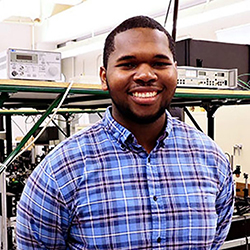
Hometown: Chicago
Degree, major: BS ’18, Physics
Faculty mentor, department: Ping Yu, physics and astronomy
Current endeavor: PhD student, bioengineering, University of Maryland, Baltimore County
When and how did it click for you that you love research?
“The first time was when I completed my first experiment. It felt good to accomplish something. In hindsight, the task was menial, but as I took on more difficult projects, I grew to appreciate the process of finishing.”
How did the mentorship component of the program effect your research, and college, experience?
“Joe Rowles and Samantha Huddleston (Mizzou alumni) were some of the greatest mentors I’ve ever had in my life. They shared a stoic leadership that eased my mind through a very difficult first two years of college. By sharing their own experiences, they helped me manage a balance between my personal life, research and classes. I wouldn’t have made it to graduate school without them, and it’s mentors like Joe and Sam that make IMSD-EXPRESS worthwhile.”
Lydia Jefferson
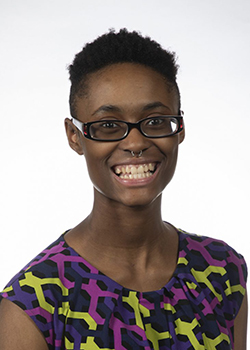
Hometown: Raytown, Missouri
Year, major: Junior environmental sciences
Faculty mentor, department: Alba Argerich, School of Natural Resources
What did you enjoy most about the experience academically and socially?
“Probably being surrounded by a diverse range of students. Sure, we come from different majors, and our skin looks a little different from each other’s, but we have all experienced similar oppression. Being able to connect to others through the pain, anger and passions that we have brings us closer together.”
What are the lessons you learned in your Mizzou research that you still use today?
“I have learned to be more patient in my everyday life, and to not feel guilty for needing or wanting to take a break. Research is a marathon, not a sprint, and by learning to take micro-breaks, I can come back with a fresher perspective and a more focused mind.”
Ben Jones
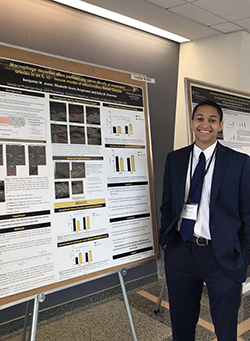
Hometown: Cincinnati
Year, major: Senior biology
Faculty mentor, department: Erika Boerman, Medical Pharmacology and Physiology
What did you enjoy most about the experience academically and socially?
“Working in a top-notch research lab is something I never imagined myself doing growing up. It has made me a better student and scientist, and it has taught me countless life lessons as well. Socially, IMSD is a great community. I have met some of my best friends through the program, and it’s a community I’m proud to be a part of. I enjoy the weekly meetings because no matter what our majors are, what our labs study or how our weeks are going, we join together and learn together. That’s what makes IMSD so special. Everyone’s story is unique, but we all strengthen the community as one.”
How did the mentorship component of the program effect your research, and college, experience?
Peer mentoring is what sets Mizzou’s IMSD program apart. My mentor was so much more than just an upperclassman that I met with weekly. He was a friend who helped me with my schedules, with the labs I was interested in, with posters, etc. The mentor program really helps students feel like they belong in the community and in their research and it has greatly affected my college experience. As a peer mentor myself, my goal is to go above and beyond for my mentees and help them feel like a part of the community.”
Dominique “Nicki” Joseph
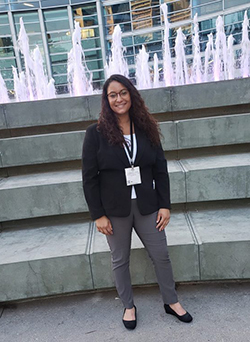
Hometown: Various international military bases
Year, major: Senior dual in biology and German
Faculty mentor, department: Charlotte Phillips, Biochemistry
What did you enjoy most about the experience academically and socially?
“Some of my best friends and connections have come from being a part of IMSD. I enjoy having so many students around me interested in the same things I am. Often, it’s difficult to talk to family and friends outside of my field about what I do. IMSD has given me the opportunity to connect with other diverse students who understand, appreciate and respect my work better than other people could.”
When and how did it click for you that you love research?
“It took only one semester for me to realize that medical school wasn’t in my future. Originally, I was unaware of opportunities in STEM outside of medical school, but joining IMSD showed me that I could do much more with a science degree. It really clicked after my first year of research. I had begun my first independent project when the graduate student I worked under left on maternity leave. I took over much of her work, ultimately juggling multiple tasks and immersing myself in work for the entire summer. At the end of that summer, I realized that time had passed so quickly, and that I had enjoyed every second of it. I knew it was something I wanted to do for the rest of my life.”
Madison Ortega
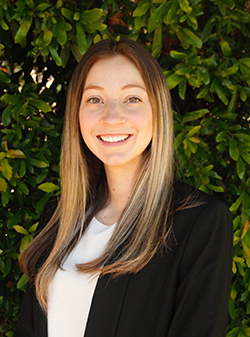
Hometown: San Diego
Degree, major: BS ’19, biological sciences
Faculty mentor, department: Cheryl Rosenfeld, Biomedical Sciences
Current endeavor: Post-baccalaureate at the National Institute of Environmental Health Sciences
What led you to IMSD-EXPRESS at Mizzou, and why did you choose to participate?
“I met Brian Booton the spring semester of my senior year of high school. In our initial encounter, he really opened my eyes to all of the wonderful research opportunities that were available at Mizzou. I had the goal of graduating with a degree in biology and attending medical school, but I hadn’t really considered the route of graduate school or research. This organization provided not only the opportunity to explore research, but it also supported me with mentors, peers and the resources to pursue my goals.”
What are the lessons you learned in your Mizzou research that you still use today?
“ ‘Just because something is difficult, doesn’t mean it is not for you.’ Brian said this at my first IMSD meeting and it’s a piece of advice I still hold onto. In life there are going to be many things that I face that might seem impossible to overcome but that doesn’t mean I can’t do it. It just means I need to work harder to get through it. I have taken this lesson into every facet of my life and it holds true every time.”
Chris Peritore-Galve
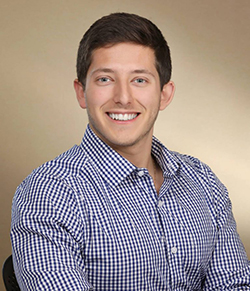
Hometown: Columbia
Degree, major: BS ’15, biology
Faculty mentor, department: Elizabeth Hoyos/Douglas Randall, Biochemistry
Current endeavor: Postdoctoral (PhD ’20, Cornell University) research fellow at Vanderbilt University Medical Center
What are the lessons you learned in your Mizzou research that you still use today?
“Right off the bat, I learned that I need patience and determination, which is still relevant today and will always be. Through my mentor, Elizabeth Hoyos (former MU faculty member), and Brian, I learned that I needed to prioritize my values in and out of the lab. For me, that means that I always consider my family when I think about my future, and I will always elevate students of color and make my labs and departments more inclusive and equitable environments.”
When and how did it “click” for you that you love research?
“When I got my own bench space and felt like I had ownership over a project. Having the ability to develop new ideas, get excited, think about them and refine them — then get excited again — is what hooked me and also keeps me going in research.”
Ellis Tibbs
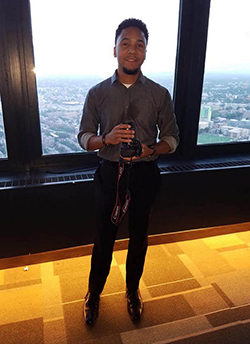
Hometown: St. Louis
Degree, major: BS ’13, biological sciences
Faculty mentor, department: Jill Kanaley, Nutrition and Exercise Physiology
Current endeavor: MD/PhD student at the University of Maryland School of Medicine
What led you to IMSD-EXPRESS at Mizzou, and why did you choose to participate?
“I was led to the IMSD-EXPRESS program because I was looking for a position that would satisfy my work study need while also aiding in my journey to becoming a physician. I also found something very welcoming and ‘homey’ about the program, something that definitely developed from Brian’s leadership. During times of stress I always found my way back to his office and the student lounge.”
When and how did it “click” for you that you love research?
“During my junior year in which I joined Jill Kanaley’s lab in nutrition and exercise physiology. Although I knew it wasn’t the best subject for me, I saw the impact that could be made in a larger scale by focusing on a few years of study. I enjoyed the constant problem-solving aspect of research. It really fulfilled my intellectual curiosity.”
This story originally appeared in MU Undergraduate Research News on August 5, 2020.


